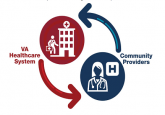The Commission on Care has issued its final report, which called for the expansion of community care for all veterans through the creation of integrated community-based health care networks similar to TRICARE, expansion of eligibility for veterans, and the creation of a facility and capital asset realignment process based on the DoD Base Realignment and Closure Commission among its 18 recommendations.
Mandated by the Veterans Access, Choice and Accountability Act in the wake of the wait time, the 15-member Commission on Care was charged with providing recommendations for reforming veterans’ health care to President Obama. The commission’s recommendations carry considerable weight. The Choice Act mandated that the VA and other federal agencies “implement each recommendation that the President considers feasible, advisable, and able to implement without further legislation.”
The commission’s first recommendation was to scrap the Choice Program and establish the VHA Care System, a system of “integrated veteran-centric, community-based delivery networks that will optimize the balance of access, quality, and cost-effectiveness.” Local VHA leadership would develop the VHA Care System and base it on “local needs and veterans’ preferences.” The VHA would be mandated to furnish credentials to community providers, with the highest priority access given to service-connected veterans. The time and distance criteria used by the Choice Program would be eliminated, and veterans would be able to choose any primary care provider from within the system.
The Commission offered 4 possible models for implementing the VHA Care System. In the recommended option (an integrated network of VHA, DoD, other federally funded providers, and community providers, which requires a referral to access specialty care), the commission predicts as many as 60% of veterans would shift to community care for primary care needs, though far fewer would seek referrals in the community. The commission also predicted about a 15% increase in enrollment and an additional $5 billion in cost by FY 2019.
Another recommendation called for a “robust strategy for meeting and managing VHA’s facility and capital-asset needs.” According to the commission, the VA must reevaluate the future of individual facilities “in light of a transformative new delivery model.” A new commission, based on the military closure commissions, would help determine which facilities would remain open and which would close. “If VA could sell, repurpose, or otherwise divest itself of unused or underutilized buildings in a timely, cost-effective manner, it would free funds for the purposes for which they are appropriated,” the commission argued.
The commission also focused on personnel issues in a number of its recommendations, calling for the transformation of VHA culture and staff engagement, performance metrics for all employees, a new personnel system, and increased cultural and military competency, “to embrace diversity, promote cultural sensitivity, and improve veteran health outcomes.”
All but 2 commissioners signed the report. The commission charged that “many profound deficiencies in VHA operations require urgent reform, and that America’s veterans deserve a better organized, high-performing health care system.” While the changes may seem sweeping to many, the 2 dissenting commissioners urged even more significant changes. In a dissent letter acquired by the Washington Free Beacon, these commissioners argue that “the disappointing reality is that the commission’s final report is deeply compromised, disjointed, and incomplete. The report repeatedly invokes the need for a ‘bold transformation’ at the VHA. Yet, with a few exceptions, there is a decided lack of boldness in the Commission’s recommendations.”
Reaction has been slow as officials at the White House, VA, and veterans group digest the 308-page report. Some groups, however, already are raising concerns. The American Legion issued a statement: “Increased privatization of veteran health care services is not in the best interest of veterans or the American taxpayer. While we are still reviewing the complete report, we note that the commission had a very limited interaction with veterans who actually use VA health care, and even less time spent in VA facilities.”
The President also issued a brief noncommittal statement. “The commission's report includes a number of specific proposals that I look forward to reviewing closely over the coming weeks. We will continue to work with veterans, Congress, and our partners in the veteran advocacy community to further our ongoing transformation of the veterans’ health care system. Our veterans deserve nothing less for their sacrifices and their service.”
The VA offered a brief reaction to the report, finding commonalities in its current reform efforts. “While we will examine the report closely over the coming weeks and respond in a more detailed fashion, I am pleased to see that many of their recommendations are in line with our MyVA efforts to transform the VA into a veteran-centric organization,” Secretary of Veterans Affairs Robert A. McDonald said in the statement. “There are some things that can be done right now to help us continue our progress. Congress must act on our proposals to consolidate our Community Care programs, modernize and reform the claims appeals process, and pass the bi-partisan Veterans First Act.”
[Click through to the 18 recommendations offered by the commission.]


